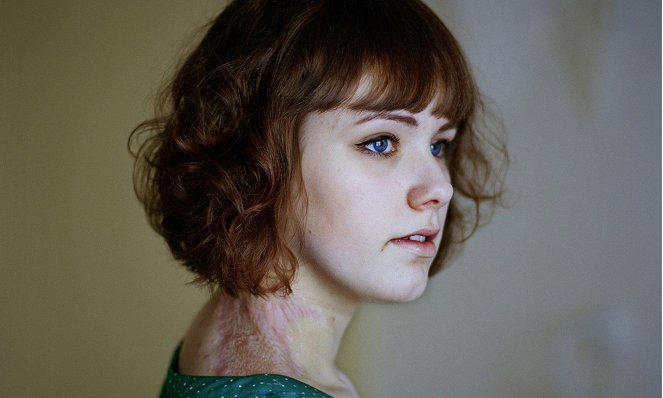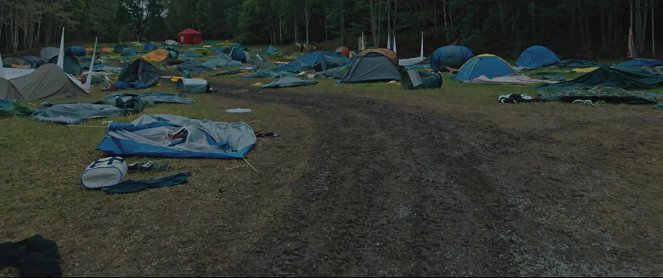Regie:
Erik PoppeKamera:
Martin OtterbeckMusik:
Wolfgang PlaggeBesetzung:
Andrea Berntzen, Aleksander Holmen, Brede Fristad, Elli Rhiannon Müller Osbourne, Sorosh Sadat, Hang Tran, Solveig Koløen Birkeland, Jenny Svennevig (mehr)Streaming (2)
Inhalte(1)
Die 18-jährige Kaja verbringt mit ihrer jüngeren Schwester Emilie ein paar ausgelassene Ferientage in einem Sommercamp auf der norwegischen Insel Utøya. Es gibt Streit zwischen den Schwestern und Kaja geht alleine zu dem geplanten Barbecue. Angeregt diskutieren die Jugendlichen über aktuelle politische Entwicklungen, als plötzlich Schüsse fallen. Erschrocken suchen Kaja und die anderen Schutz im Wald. Rasend kreisen ihre Gedanken. Was passiert um sie herum? Wer sollte auf sie schießen? Kein Versteck scheint sicher. Doch die Hoffnung auf Rettung bleibt. Und Kaja setzt alles daran, Emilie zu finden. Während die Schüsse nicht verstummen wollen. (Weltkino)
(mehr)Videos (4)
Kritiken (7)
Ein weiterer unglücklicher Film, der zeigt, dass das Gefühl der Sicherheit lediglich eine Illusion ist. In Utøya spielt Authentizität eine Hauptrolle. Ich kann mir vorstellen, dass bei diesem Film viele Zuschauer behaupten werden, dass die Form über dem Inhalt steht. Mir erschien es jedoch definitiv nicht so, obwohl ich verstehen kann, dass Utøya, 22. Juli nicht für jeden bestimmt ist, da es ein sehr anspruchsvolles Werk ist, um ihm folgen zu können. Den Schöpfern gebührt große Anerkennung, vor allem für die Aufnahme der Geschichte in relativ schwierigem Gelände und mit unberechenbaren Kinderdarstellern in einer einzigen Einstellung! Beeindruckend und emotional sehr unangenehm und beunruhigend.
()
Hats off to the filmmakers for managing to pull this off in one single shot. It adds an incredible sense of authenticity. It’s just a shame that the movie is sometimes lacking in atmosphere. After all, it took the Norwegian cops ages to finally catch that damned Breivik. On the other hand, I must admit that the actual content overpowered the premise. Even if this movie brims with quality filmmaking, it’s ultimately still “just” a reconstruction of a massacre and nothing more. After watching this, I had to go watch some documentaries as well to get a better picture on this. If it were up to me, I’d sent Breivik to Guantanamo so that they could go rogue on his ass. Whatever the Norwegian press sometimes write about their prisons make them look like a walk in a park, which is a laughable punishment for what he’s done.
()
Overrated to the point of woe and a completely unrewarding and unnecessary film that only feeds Brevik's infamy in the media. The event that took place on 22 July 2011 on the island of Utøya in Norway was horrific, resulting in the death of 77 young students, but unfortunately the film falls far short of representing the horror that took place in reality. I had a big problem with the fact that we see absolutely nothing in the film only hear it, so my experience would be quite similar if I was blind. The film only focuses on one girl who runs, screams, hides in among the threes or under a rock looking for her sister for the entire film, while Breivik is somewhere in sight shooting at the students, but all you hear is gunshots, screaming and running. There is only one dead body, one wound and absolutely no blood in the film, not even Breivik himself is shown, and I take that as a huge screw-up since they mention the word 'massacre' everywhere. It's filmed quite authentically and in one take, but so what if nothing happens for the whole film. I hope Paul Greengrass makes a real massacre in the American remake next year, with steamy psychological terror and a maniacal Breivik to showcase the real horror that took place back then on screen. If only they had at least shown pictures of the deceased at the end so I could take it as a memorial, but I didn't get to see that either. This has no balls, no juice, no drive, no emotion. Bleh. 30%
()
I believe that a thoughtfully enriching and formally courageous film can be made about the events in Norway seven years ago that not only leaves viewers shaken, but also forces them to think. Utøya: July 22 is really not such a film. Though I appreciate that its makers wagered predominantly on the realistic motivation of the scenes (which, however, is somewhat superfluous in a film with fictional characters), that in itself is not a guarantee of a good film. On the contrary, it leads to the fact that most of the film’s runtime consists of long, suspensefully simple shots of several characters hiding and sitting tight somewhere in the forest or under a rocky cliff. Furthermore, any authenticity is demolished by tasteless melodramatic crutches (a mother calling her dead daughter, a micro-plot with a boy in a yellow jacket) suggesting that the main and perhaps only (cynical) ambition of the film’s creators was to wring some emotions out of the viewers, to claw at their souls a bit by exploiting real terror (after all, this intention is indicated with a certain guilelessness by the sentence that Kaja delivers at the beginning while looking at the camera when she calls her mother: “You will never understand, just listen to me”). But the narrative is too straightforward (for proof that this can be done more inventively, see Van Sant's complex Elephant) and there are too few variables at play that would draw us into the story, so Utøya does not work even as an “adventure” survival horror movie. We may ask ourselves whether Kaja will survive or not, whether she will find her sister or not, but that’s all. Poppe relies on our connection to the protagonist, but forgets that the film is not a video game in which fear for the character’s life enhances the player’s control over her actions. As Son of Saul recently showed, it is possible to hold our attention without letting us catch our breath in the present moment while also making a complex statement on a particular tragedy. By contrast, Utøya is a paradoxical reconstruction of an event about which we learn almost nothing, with the exception of the opening and closing explanatory titles. For me, this is a prototype of a useless film without value added, which was made mainly to provoke a media response. It is a film in which it is possible to admire the athletic performance of the leading actress and the cameraman (even though the personalised camera work, which sometimes reacts to the surrounding stimuli independently of the characters, creates the misleading impression that we are watching scenes composed of found footage). 50%
()
A thorough lesson in cheap narrative manipulation. I believe that an audience of a highly sensitive nature might be impressed, and I can’t deny at least the strong depiction of those seemingly endless 72 minutes (though that’s probably because the concept of the film is utterly boring and several passages are endless, especially for the viewer). A strong and heavy topic transformed into flat narration that lacks arguments, which only aims to exhaust the viewer without stimulating any interpretation or curiosity. To a great extent, this is thanks to the properly authentic and chilling format, but it’s mostly tedious, shallow and uninteresting, which for a premise like this it’s very bad. Paul Greengrass’s 22 July is far more intense because it doesn’t rely only on effect and it’s not afraid to place the whole event, including the suffering of the innocent victims (for which I can't find enough words of sympathy) in a much more urgent and provocative argumentative context (and no, the film cannot be defended with the argument that it should only be a raw depiction of the events on the island, because such depiction should communicate with the viewer instead of having them yawn). 50%
()
Galerie (33)
Photo © Gussi Cinema



Werbung